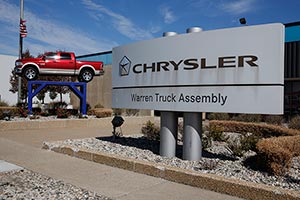Ram CEO Targets Growth in Commercial Van and Truck Sales

Bob Hegbloom — CEO of the Ram brand — might have a problem.
His boss, Fiat Chrysler Automobiles CEO Sergio Marchionne, has doubled down on the Ram and Jeep brands and is counting on those brands to carry the load for the company's growth in the coming years.
But at least for now, the automaker has maxed out its production capacity at its Warren Truck Assembly Plant, where the company makes most of the Ram 1500 pickups sold to individual consumers.
Now, Hegbloom hopes to keep those retail sales humming while working to expand the brand's commercial sales by selling more ProMaster vans and pickups designed for business usage.
"We have demand that exceeds what we can build today and, on the one hand, that's a nice position to be in. But on the other hand, there's opportunity out there" that the Ram brand must pass up, Hegbloom said.
The Ram brand largely is a victim of its own success.
Industry sales of pickups have exploded over the past five years as housing has recovered and some lifestyle buyers have returned to the market after it was devastated by the recession.
But Ram has snagged a larger share of the industry's truck market than expected. Ram's share of full-size pickup sales in the United States has jumped to 20.6% in 2015 from 14.8% in 2010.
To be sure, the Ram 1500 still is America's third-favorite pickup. Ford's F-150 lineup is, by far, the market leader. Last year, the F-150 held a 35.7% share of full-size pickup sales, and the Chevrolet Silverado was second with 27.5%.
Still, Ram's growth has been eye-popping. Sales of the brand's full-size truck have more than doubled to more than 451,000 in 2015 from about 200,000 in 2010.
FCA accomplished its sales and market share growth by developing a wider range of models that it sells for higher prices than ever before. New models such as the off-road-ready Ram Rebel and the luxurious Ram Limited have been hits.
"Some of those Ram special editions and packages are nice ways to keep up interest while also maximizing your profit margin," said Stephanie Brinley an analyst with IHS Automotive. "Ram is delivering a wide range of products to consumers and has been able to keep their products fresh and exciting."
With the housing industry still growing and gas prices low, pickup sales are unlikely to fall anytime soon.
"But guess what? We can’t build anymore," Hebgloom said.
Eventually, FCA will fix that problem by moving production of its next-generation Ram 1500 from Warren Truck to Sterling Heights Assembly after it phases out the Chrysler 200. While that plan has been widely reported, the company has yet to confirm it or provide details about the move, which won't be complete for about two years.
Until then, Hegbloom aims to take the commercial van and commercial truck market by storm.
The company builds its heavy-duty pickups as well as the bare-bones Ram 1500 models targeted toward construction tradesmen and other business buyers at its plant in Saltillo, Mexico.
That plant produced about 240,000 pickups last year and has the ability to manufacture about 280,000 pickups, according to IHS Automotive. FCA also makes its ProMaster full-size van in Saltillo and imports the ProMaster City commercial van from Bursa, Turkey.
Introduced in 2013, the ProMaster van has leaped from nonexistent to third place among large commercial vans sold in the United States. The ProMaster competes against the Ford Transit, Chevrolet Express, Nissan NV and the Mercedes-Benz Sprinter.
In 2015, FCA sold 28,345 ProMaster and 11,124 ProMaster City vans in the United States.
Last fall, Ram landed a contract to supply the U.S. Postal Service with more than 9,000 Ram ProMaster cargo vans, a high-profile contract that raises brand awareness.
Hegbloom said Ram also has more than doubled its network of "BusinessLink" dealers from 450 in 2012 to more than 1,000 nationwide, putting Ram in a much better position to boost sales to fleet buyers.
"Now I have a dedicated field out there of dealers," Hegbloom said. "I had to get my network. I had to get my portfolio of products — which we have now — so I can compete across the board. Now the last thing is the messaging."
Winning new commercial customers requires Ram to get its messages to micromarkets. A catering company needs a different van than a painter or an electrician.
"So, if you are talking to a painter, then you are going to want to talk about the attributes of the vehicle you can offer them," Hegbloom said. "I don’t want to talk to an electrician with a message that goes after the painter."

